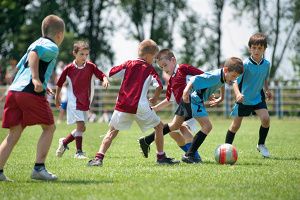មាតិកា
តើធ្វើដូចម្តេចដើម្បីជួយកូនរបស់អ្នកឱ្យជ្រើសរើសកីឡា?

Choose a sport that gives pleasure to the child
The importance of pleasure in choosing a sport for the child
It should be known that the child does not generally practice a sport “for his health”, because this is still too abstract a concern for him.1. Rather, it is focused on the effects directly associated with physical activity, such as pleasure and increased self-esteem, so it is the playful dimension that mainly feeds a child’s interest in sport. Ideally, the choice of sport should even come from the child and not from the parents, knowing that it is from 6 years old that the child becomes very active physically and likes to participate in games supervised by rules2.
However, the pleasure of sport does not exclude performance since it can precisely be closely linked to the testing of the child’s personal abilities. It turns out that they generally find it more enjoyable when playing sport is coupled with a goal of self-improvement, and associate sporting success more with cooperation than a demonstration of their superiority over others.1.
What are the risks for a child to practice a sport without pleasure?
If the parent can encourage his child to choose a sport, it is better to take into account his personal tastes, at the risk of seeing him quickly demotivate, or act under duress. It can happen that parents have high expectations regarding their child’s performance in sport, to the point of inflicting counterproductive pressure on him.3. Even if the child initially shows an interest in the sport in question, this pressure could end up causing only frustration for him, a desire to surpass himself not for himself but for those around him, and which would result. out of disgust.
In addition, excessive efforts, athletic overwork – beyond 8-10 hours of sport per week4 – can cause growth problems in the child and physical pain2. The pain associated with overtraining is often a sign that the body’s ability to adapt has been exceeded and should constitute a warning signal. It is therefore recommended to slow down the effort, or to stop the painful gestures, even outside the sporting framework. Overtraining can also be manifested by significant fatigue not relieved by rest, by behavioral problems (a change in mood, eating disorders), a loss of motivation, or even a decline in academic performance.
Finally, it is quite possible that the child will not find the sport that suits him the first time. It is necessary to give him the time to discover them, and not to specialize him too early, because this would lead too quickly to intensive training which is not necessarily adapted to his age. He may therefore have to change sports several times, as long as this does not hide a lack of motivation and perseverance.
ប្រភព
M. Goudas, S. Biddle, Sport, physical activity and health in children, Childhood, 1994 M. Binder, Your child and sport, 2008 J. Salla, G. Michel, Intensive sports practice in children and dysfunctions of parenthood: the case of the syndrome of success by proxy, 2012 O. Reinberg, l’Enfant et le sport, Revue medical la Suisse romande 123, 371-376, 2003










